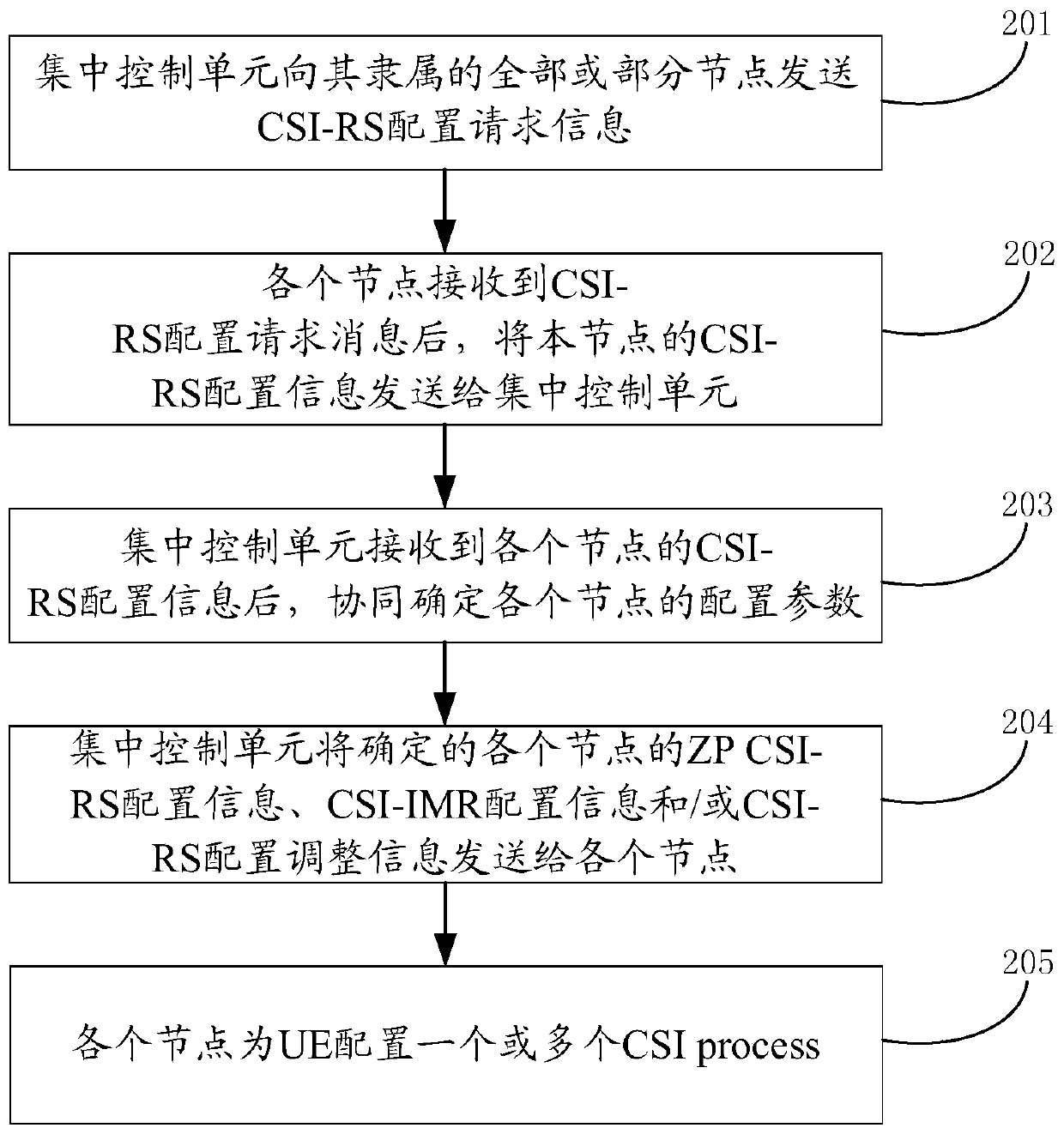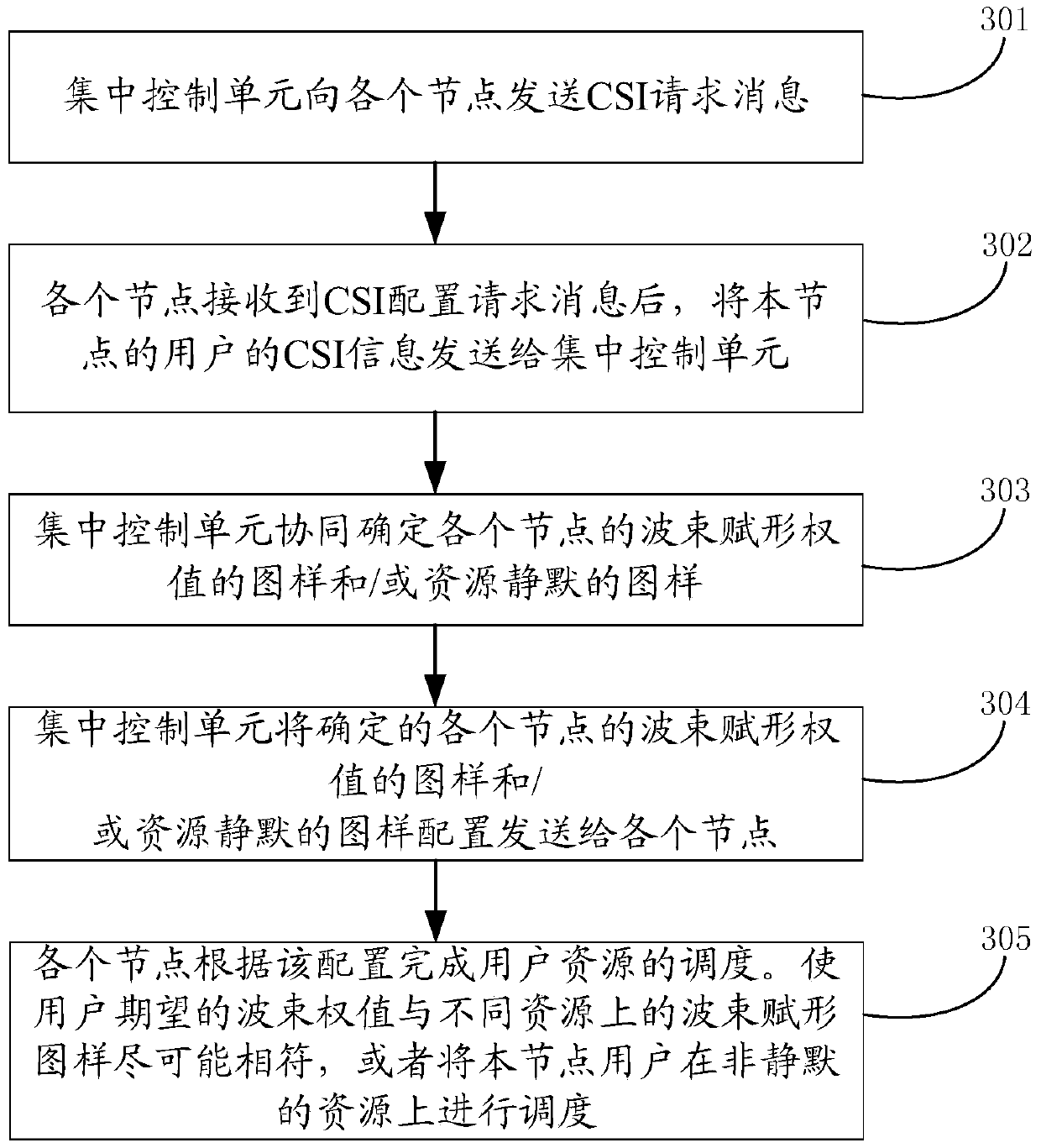Scheduling configuration method and device
A configuration method and technology for configuring information, applied in the directions of location diversity, pilot signal allocation, payload allocation, etc., can solve problems such as difficulty in cooperation, affecting the performance of non-COMP users, and complex interaction between nodes
- Summary
- Abstract
- Description
- Claims
- Application Information
AI Technical Summary
Problems solved by technology
Method used
Image
Examples
Embodiment 1
[0088] In this embodiment, the CSI-RS, ZPCSI-RS and CSI-IMR of all or part of the nodes to which it belongs are configured cooperatively by the centralized control unit. figure 2 It is a flow chart of the scheduling configuration method in Embodiment 1 of the present invention, such as figure 2 As shown, the scheduling configuration method of this example includes the following steps:
[0089] Step 201: the centralized control unit sends a CSI-RS configuration request message to all or some nodes to which it belongs;
[0090] Step 202: After receiving the CSI-RS configuration request message, each node sends the CSI-RS configuration information of the node to the centralized control unit;
[0091] Step 203: After receiving the CSI-RS configuration information of each node, the centralized control unit coordinates to determine the configuration parameters of each node;
[0092] After receiving the CSI-RS configuration information of each node, the centralized control unit c...
Embodiment 2
[0105] In this embodiment, the pattern of beamforming weights of each node and / or the pattern of resource muting is cooperatively configured by the centralized control unit. The specific collaborative configuration process is as follows:
[0106] image 3 It is a flow chart of the scheduling configuration method in Embodiment 2 of the present invention, such as image 3 As shown, the specific collaborative configuration process is:
[0107] Step 301: the centralized control unit sends a CSI request message to each node;
[0108] Step 302: After receiving the CSI configuration request message, each node sends the CSI information of the user of the node to the centralized control unit;
[0109] Step 303: The centralized control unit cooperatively determines the pattern of beamforming weights and / or the pattern of resource silence for each node;
[0110] Step 304: The centralized control unit sends the determined patterns of beamforming weights of each node and / or pattern conf...
Embodiment 3
[0119] In this embodiment, the use of DMRS ports at the edge and the configuration of DMRS initialization parameters between the nodes are cooperatively configured by the centralized control unit. The specific collaborative configuration process is:
[0120] Step 401: the centralized control unit sends a CSI request message to each node;
[0121] Step 402: After receiving the CSI configuration request message, each node sends the user CSI information of the node to the centralized control unit;
[0122] Step 403: The centralized control unit cooperates to determine the DMRS port allocation and initialization parameters of each node:
[0123] Step 404: The centralized control unit sends the determined DMRS port allocation and initialization parameters of each node to each node.
[0124] Step 405: each node schedules the user on the corresponding resource to transmit data according to the configured DMRS port and initialization parameters.
[0125] After each node obtains its ...
PUM
 Login to View More
Login to View More Abstract
Description
Claims
Application Information
 Login to View More
Login to View More - R&D
- Intellectual Property
- Life Sciences
- Materials
- Tech Scout
- Unparalleled Data Quality
- Higher Quality Content
- 60% Fewer Hallucinations
Browse by: Latest US Patents, China's latest patents, Technical Efficacy Thesaurus, Application Domain, Technology Topic, Popular Technical Reports.
© 2025 PatSnap. All rights reserved.Legal|Privacy policy|Modern Slavery Act Transparency Statement|Sitemap|About US| Contact US: help@patsnap.com



